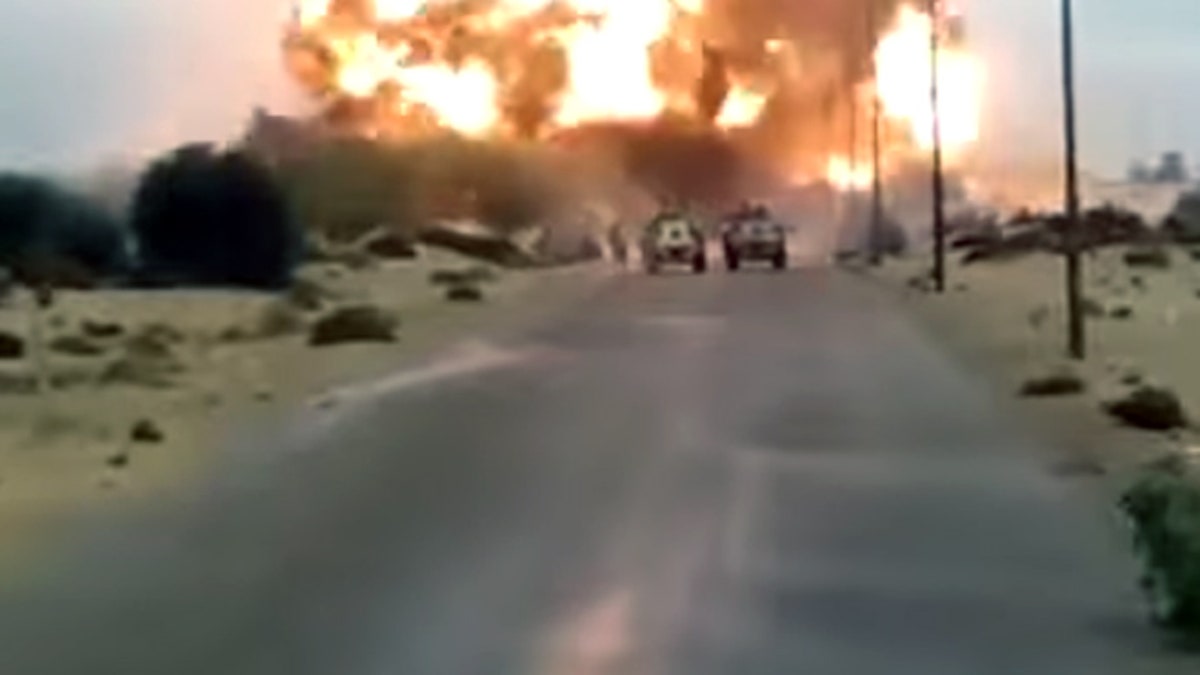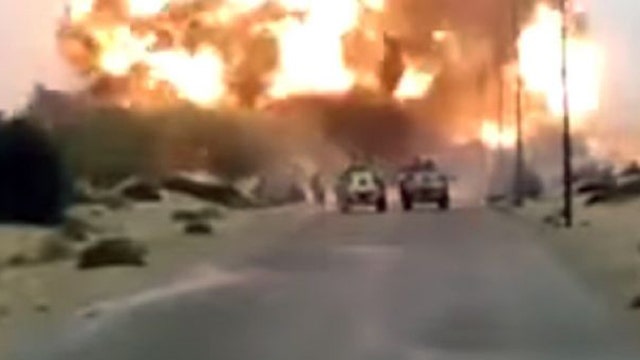ISIS' coordinated attacks kill at least 50 in Egypt
Terror group targets Egyptian Army checkpoints
Islamic militants on Wednesday unleashed a wave of simultaneous attacks on Egyptian Army checkpoints in the restive northern Sinai Peninsula, killing at least 64 soldiers, country officials said.
The coordinated assaults, which included up to 70 militants, came a day after Egypt's president pledged to step up the battle against Islamic militants and two days after the country's state prosecutor was assassinated in the capital, Cairo. The BBC reported that the clashes are ongoing, with militants reportedly overtaking a main police station.
"This incident is a game-changer."
The officials said scores of militants were besieging Sheikh Zuweid's main police station, shelling it with mortars and rocket-propelled grenades and exchanging fire with dozens of policemen inside. Reuters reported that militants planted bombs along a road between the police station and an army camp to deter reenforcements.
"We are under siege, the militants didn't storm inside it so far, or else I wouldn't be speaking to you right now," Col. Mohamed Soliman told Daily News Egypt from inside the police station
Al Jazeera, citing a local news, reported that ambulances had trouble reaching those injured due to the crossfire.
The United States strongly condemned the attacks.
White House spokesman Ned Price said Wednesday's assault is a terrorist attack and that the U.S. "stands resolutely" with Egypt. He added that the U.S. extends condolences to the relatives of those who died, as well as to the government and the Egyptian people.
The Israeli military says it has closed the country's border crossings with Egypt and Gaza in the wake of the assault, without elaborating.
Officials who spoke on condition of anonymity because they were not authorized to speak to the press also said 90 militants and four civilians were killed in the fighting, according to The Associated Press.
The scope and intensity of the attacks underscored the resilience and advanced planning by the militants, who have for years battled Egyptian security forces in northern Sinai but intensified their insurgency over the past two years just as the government threw more resources into the drawn-out fight. Israel closed two border crossings after the attack and announced its defense forces were monitoring the events.
"This incident is a game-changer," an Israeli official told Reuters on condition of anonymity. "We are attentive to Egypt's needs, as always."
An ISIS affiliate in Egypt claimed responsibility for the attacks, saying its fighters targeted a total of 15 army and police positions and staged three suicide bombings, two of which targeted checkpoints and one that hit an officers' club in the nearby city of el-Arish.
The authenticity of the claim could not be immediately verified, but it was posted on a Facebook page associated with the group.
An Egyptian blogger, Wael Abbas, told Al Jazeera that militant supporters expressed on Twitter that they wanted to "eradicate the military's presence in Sinai."

Video purportedly showing an attack on an Egyptian army truck convoy appeared online Wednesday. (Screen grab)
"It seems that the Islamists just like in Iraq and Syria want Sinai to go to the Islamic State," Abbas said.
Except for the attack at the officers' club, the rest took place in the town and targeted at least six military checkpoints, the officials said. The militants also took soldiers captive and seized weapons and several armored vehicles, they added, speaking on condition of anonymity in line with regulations.
At least 54 other soldiers were wounded, the officials said. As fighting raged, an army Apache gunship destroyed one of the armored carriers captured by the militants as they were driving it away, the officials added. Egypt launched F-16 fighters to respond in the region and Egypt's military spokesman, Brig. Gen. Mohammed Samir said the country's armed forces have targeted two militant gatherings in northern Sinai, completely destroying them.
Samir's statement, posted on his official Facebook page, said some 70 militants attacked five checkpoints in northern Sinai and that Egyptian troops killed 22 of them and destroyed three all-terrain vehicles fitted with antiaircraft guns.
Northern Sinai has over the past two years witnessed a series of complex and successful attacks targeting Egyptian security forces, many of which have been claimed by a local affiliate of the Islamic State group.
The attacks came just two days after the assassination in Cairo of the country's top prosecutor, Hisham Barakat, and one day after President Abdel-Fattah el-Sissi vowed to step up a two-year crackdown on militants.
Last week, Islamic State spokesman Abu Mohammed al-Adnani called in an audio message on ISIS followers to launch massive attacks during the Muslim holy month of Ramadan, which is now entering its third week.
Militants in northern Sinai stepped up their attacks following the July 2013 military ouster of Islamist President Mohammed Morsi after days of mass street protests against his rule.
El-Sissi, then the nation's army chief, led the ouster and went on to become Egypt's president, winning a landslide election a year ago on a ticket that emphasized security and economic recovery.
The attacks came in swift response to el-Sissi's pledge the previous day to carry out justice for the prosecutor general's assassination — and possibly move to execute Muslim Brotherhood leaders, an Islamist group from which Morsi hails.
Egypt has, since Morsi's ouster, waged a crackdown that has led to thousands of arrests, mass convictions and death sentences. Morsi is among those condemned to die, but has a potentially lengthy appeals process ahead of him.
El-Sissi said the government was ready to brush aside criticisms and free the judiciary's hand for a "battle" the country is prepared to wage.
"The judiciary is restricted by laws, and swift justice is also restricted by laws. We will not wait for that," el-Sissi said.
Action will be taken within days "to enable us to execute the law, and bring justice as soon as possible," he said. "We will stand in the face of the whole world, and fight the whole world."
In a thinly veiled reference to jailed members of the Brotherhood, el-Sissi blamed the violence on those "issuing orders from behind bars," and warned: "If there is a death sentence, it will be carried out."
The Associated Press contributed to this report.





















